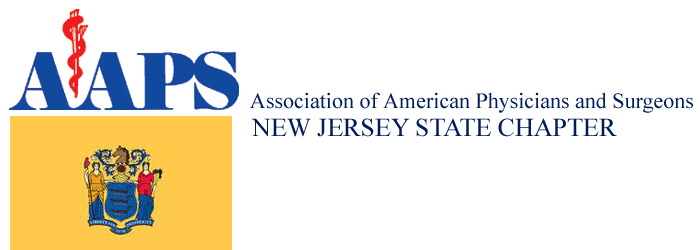A Better Way to Provide Charity Care
 Wednesday, July 23, 2014 at 12:15AM
Wednesday, July 23, 2014 at 12:15AM The Association of American Physicians and Surgeons
New Jersey taxpayers provide “charity care” to thousands of patients each year at a cost of over one billion dollars.
This massive expenditure is in addition to the $12 to 13 billion dollars spent annually in the state for 1 Medicaid. The Affordable Care Act (ACA), despite promises to the contrary, will neither address the needs of the destitute for medical care, nor control the costs associated with that care, and may, in fact, increase the hardship and costs for needy residents of New Jersey. A new resolution put forth to the New Jersey State Legislature, NJ S239, has been written to ameliorate these concerns, reducing costs while providing muchneeded care.
The Problem: Government Run Medicine
- Medicaid rolls are expected to double under the ACA.
- Medicaid patients, according to an Oregon study, are more likely to seek care at an emergency room than are patients with no medical insurance coverage. This adds to the problem of unnecessarily overused emergency rooms.
- Emergency rooms are frequently used by patients with nonemergent illnesses. This causes overcrowding and places a tremendous burden on physicians, nurses, and hospital staff.
- Physicians, in greater numbers, are refusing to take new Medicaid patients as this government run program fails to cover their costs. This only adds to the ever increasing demand for care exacerbated by problems with the Medicaid program.
- Bureaucrats are being hired in greater numbers to handle Medicaid regulatory paperwork under the guise of controlling fraud and abuse while, in essence, rationing care.
- Physicians, unable to meet their financial obligations, are leaving the state or closing their offices and retiring early. This increases the demand and cost for medical care.
- Patients, frustrated with problems inherent in the system, are becoming increasingly angry and filled with despair.
- Physicians and nurses provide ready access to free, local primary care. This is true charity.
- Volunteers from the community provide nonbureaucratic, practical, lowercost staffing.
- Physicians who provide care through free clinics receive free medical malpractice coverage under the Federal Tort Claims Act (FTCA) which deems them part of the national public health service for the purpose of such coverage.
- Patients, regardless of economic circumstances, have access to medical care. Poverty is usually fluid and temporary, so those in need can continue to utilize clinics while working in entry level positions until they are able to pay for primary care on their own.
- Taxpayers do not bear the costs of providing care.
- Citizens gain a sense of satisfaction that local needs are being met.
- Community residents learn by example to help those in need in ways beyond health care, such as contributing to food pantries and clothing drives.
- Former patients often give back to the community by volunteering in free clinics.
- Providers and patients share in a mutuallyuplifting experience.
- Taxpayers benefit from economic improvement due to the reduced burden on the state’s budget.
The Proposal: New Jersey Charity Clinics
- Legislators pass and the Governor signs NJ S239 into law providing medical malpractice coverage for the entire practice of each physician who donates service, extending coverage for attending and resident physicians and medical students in state medical schools (the cost of covering medical school physicians is approximately ten million dollars per year).
- Legislators facilitate the opening of new, nongovernment charity clinics by freeing empty government buildings such as office space, old schools, or previouslyclosed hospitals.
- Churches assist is setting up clinics near the emergency rooms of existing hospitals. Such clinics do not use taxpayer funds to run their operations but solicit donations from philanthropic individuals and businesses.
- Physicians donate four hours per week either working through or in a nongovernment, free clinic.
- Surgeons participate by agreeing to handle two cases per month in the hospital.
- Clinics and hospitals screen and list FTCA participating professionals thereby demonstrating quality control measures (the FTCA deeming process is renewed annually).
- Clinics establish the criteria by which patients receive care reducing the need for bureaucratic oversight or the issuance of identification cards.
- Hospitals may use the charity care program for patients who need hospitalization but cannot afford care.
The Bill: NJ S239 (Prime Sponsors: Singer, Stack, Oroho)
Physicians, dentists, and other medical professionals who donate four hours in or through a nongovernment, free clinic, having been deemed fit under the Federal Tort Claims Act, shall be immune from any civil liability or other legal action. Any such liability and resulting legal action shall be borne by the State of New Jersey.
Summary and Conclusion
The Medical Society of New Jersey, the Association of American Physicians and Surgeons, the New JerseyInstitute of Civil Justice, and several religious organizations (eager to open clinics) support this legislation.
Legislators in both the Senate and Assembly have been fully briefed through numerous meetings, and many are supportive. In addition, the legislative staff of the majority and minority leadership and staff in the office of the Governor have also received full briefings on the proposal. Senator Singer, who serves on the board of a Federally Qualified Health Center (FQHC), estimates that, if enacted, the state would save 250 million dollars per year.
Members of other state legislatures have reviewed this proposal and the response has been very positive. The bill has been introduced in the Commonwealth of Virginia. The Presidentelect of the Medical Society of Virginia supports the bill and has asked for help to pass this legislation.
NJ S239 will be a force for positive change in New Jersey for patients, physicians, and taxpayers – your constituents!
Alieta Eck, MD
Cofounder, Zarephath Health Center, www.zhcenter.org
2012 President, Association of American Physicians and Surgeons, www.aapsonline.org
7324630303
EckMDs@gmail.com
 admin | Comments Off |
admin | Comments Off | 




